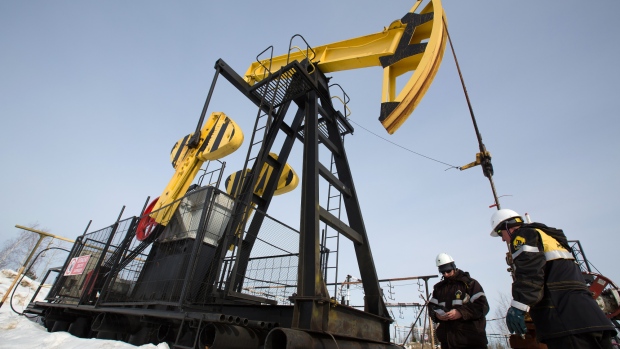Jun 5, 2018
Crude slides as U.S. is said to ask OPEC for supply increase
, Bloomberg News

Crude declined after the U.S. government was said to have asked Saudi Arabia and other OPEC producers to raise oil supply.
The request for a 1 million-barrel-a-day increase follows Washington’s decision to reimpose sanctions on Iranian crude exports that had removed roughly the same amount from global markets when restrictions were previously in place earlier this decade. OPEC pumped 31.9 million barrels a day last month, unchanged from April when production was the lowest in a year, according to a Bloomberg survey.
Crude has lost its grip after last month rising to the highest level in more than three years. The decline follows a proposal by Saudi Arabia and Russia to ease output cuts to replace potential supply losses in Iran and Venezuela. With the Organization of Petroleum Exporting Countries’ next summit a little over two weeks away, the market is looking for any clues on the scale of possible output increases.
“OPEC has every potential reason to raise production, they’ve achieved their mission,” said Nitesh Shah, a commodity analyst at Wisdomtree Europe Ltd. “That’s going to be the focus for the next few weeks now.”
Brent futures for August settlement fell as much as US$1.48 to US$73.81 a barrel on the London-based ICE Futures Europe exchange, and were at US$74.33 as of 1:53 p.m. local time. The global benchmark crude earlier fell beneath its 50-day moving average for the first time since April 4. Brent traded at a US$9.86 premium to West Texas Intermediate for the same month.
WTI for July delivery dropped 24 cents to US$64.51 a barrel on the New York Mercantile Exchange. Total volume traded was about 12 per cent above the 100-day average.
Other oil-market news:
- Kazakhstan said Monday it agrees with calls by Saudi Arabia and Russia to start easing supply cuts. The CBOE Oil ETF Volatility Index settled at 29.49 points on Monday, the highest level since February. Implied volatility on second-month WTI options contracts held near the highest since February. U.S. crude inventories dropped by 3 million barrels last week, according to the median estimate in a Bloomberg survey. Oil demand is surging higher in 2018 and consumption in China is probably stronger than the market’s anticipating, Jeff Currie, head of commodities research at Goldman Sachs Group Inc., said at the S&P Global Platts Crude Oil summit in London.


